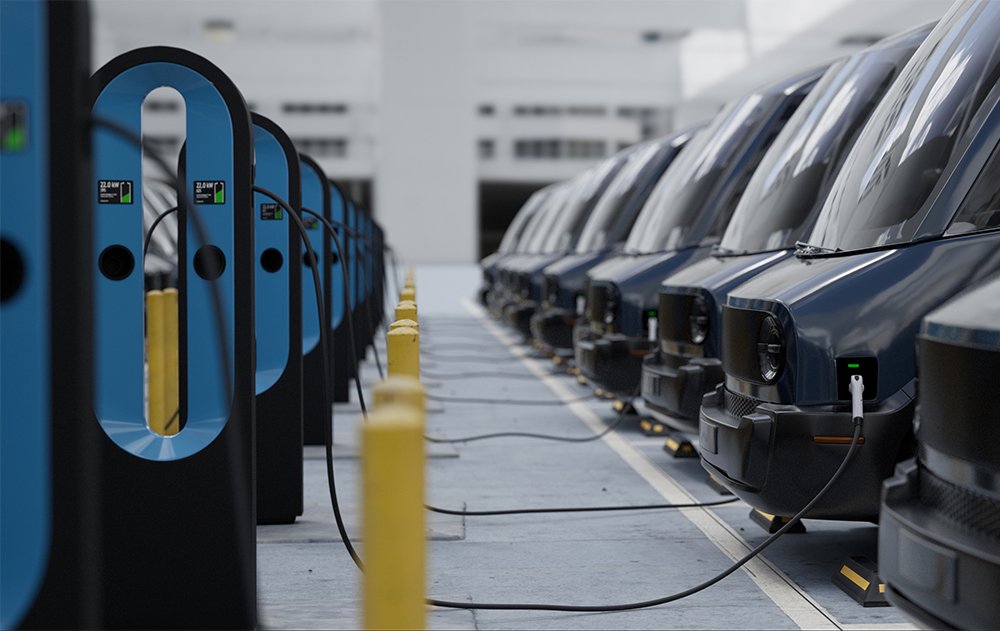Will the US commercial fleet industry embrace the benefits of electrification, or will it be dragged kicking and screaming into the EV era? Recently we’ve seen some encouraging signs that the staunch opposition that some EV advocates fear is not materializing.
A coalition of commercial fleet operators has sent an open letter to the governors of nine states, urging them to adopt California’s Advanced Clean Trucks (ACT) and Advanced Clean Cars II (ACC II) regulations.
Back in May, the California Air Resources Board (CARB) voted to finalize its Advanced Clean Fleets (ACF) regulations, which requires all trucks to be zero-emission by 2042. The ACF rules complement CARB’s Advanced Clean Trucks and Advanced Clean Cars rules, and together they set a timetable for phasing out ICE vehicles.
Several industry trade associations expressed strong opposition to the ACF rules. One exec predicted that ACF would “guarantee a complete dismantling of our state’s trucking industry.” Another made a number of incorrect statements about EVs in a speech to the US Congress. EV opponents formed the Clean Freight Coalition to lobby against clean freight regulation.
This was, and is, a worrying development for EV advocates—it’s hard to imagine an effective transition to EVs if trucking firms are going to piss on the whole idea. When Charged asked former Daimler exec and electric truck advocate Rustam Kocher about the issue, he wasn’t surprised at the opposition. “This industry is very, very old-school, very, very conservative. You’ll see pushback from them until TCO becomes positive operating the vehicles,” he told us.
Things started to look a little brighter in July, when some of the nation’s largest truck-makers, including Cummins, Daimler, Ford, GM, Hino, Isuzu, Navistar, Paccar, Stellantis and Volvo, along with the Truck and Engine Manufacturing Association, pledged to comply with the ACF regulations.
The latest news comes from the Ceres Corporate Electric Vehicle Alliance, a coalition of 31 companies that collectively own, lease or operate over 2.7 million fleet vehicles (both passenger cars and heavy-duty vehicles) in the US. In a letter to the governors of nine states, the group wrote that more widespread adoption of both ACT and ACC II would enable companies to plan more effectively for rollouts of clean vehicles.
“By adopting policies like ACT and ACC II, state policymakers can help fleets access the volume and variety of zero-emission vehicle models they need to unlock significant economic, health, and climate benefits,” the alliance members wrote.
Eight states have already adopted the ACT rule, and six more are in the process of adopting it. At least six states have adopted the ACC II rule, and seven more are working to complete the process before the end of 2023.
“The ACT and ACC II rules will accelerate and guide the clean vehicle transition, helping to satisfy the demand for zero-emission trucks and vans while sending a clear market signal to companies and utilities to invest in building the charging infrastructure necessary to support them,” said Abby Campbell Singer, Head of Climate and Infrastructure Policy at Siemens, a member of the Ceres alliance. “We encourage governors across the country to adopt these key policies and capitalize on the surge in private and public investment available for the clean vehicle transition.”
Source: Ceres Corporate Electric Vehicle Alliance

order lasuna – diarex price buy himcolin pills
order besivance – purchase besivance eye drops purchase sildamax
gabapentin 600mg pills – buy ibuprofen 600mg generic sulfasalazine 500 mg oral
order celebrex 100mg for sale – order urispas pills indomethacin 50mg for sale
mebeverine 135 mg generic – generic colospa pletal 100 mg usa
buy generic diclofenac online – aspirin 75 mg for sale aspirin price
rumalaya brand – endep buy online elavil 10mg drug
pyridostigmine order online – order sumatriptan 25mg sale buy imuran sale
order generic voveran – diclofenac order purchase nimotop pill
buy baclofen 10mg for sale – order baclofen for sale feldene for sale online
order cyproheptadine online cheap – periactin 4 mg tablet buy tizanidine 2mg online
artane pills – buy emulgel online cheap where can i purchase emulgel
order cefdinir 300mg pill – buy clindamycin generic clindamycin usa
buy generic isotretinoin 40mg – cost dapsone 100 mg order deltasone online cheap
order deltasone online – purchase omnacortil permethrin uk
acticin cost – permethrin oral retin drug
betnovate sale – cheap benoquin buy cheap generic benoquin
buy flagyl 200mg without prescription – order cenforce 100mg pills cenforce for sale online
augmentin 625mg price – order augmentin 375mg online cheap order levothyroxine for sale
cleocin for sale online – buy cleocin generic indocin 50mg generic
buy cozaar pill – buy keflex generic keflex 125mg over the counter
where to buy crotamiton without a prescription – buy generic bactroban ointment over the counter buy aczone for sale
modafinil brand – buy modafinil 100mg buy melatonin 3 mg without prescription
how to buy bupropion – shuddha guggulu cost buy shuddha guggulu pills for sale
buy capecitabine online cheap – naproxen price danocrine drug
oral prometrium 200mg – ponstel tablet fertomid for sale
buy fosamax 35mg online – alendronate 35mg generic buy medroxyprogesterone 10mg online
buy aygestin without prescription – norethindrone brand yasmin price
purchase estrace generic – generic ginette 35 anastrozole 1mg cost
cabergoline 0.5mg generic – purchase alesse cheap alesse
シルデナフィル処方 – г‚·гѓ«гѓ‡гѓЉгѓ•г‚Јгѓ«йЂљиІ© г‚·г‚ўгѓЄг‚№ и–¬е±ЂгЃ§иІ·гЃ€г‚‹
гѓ—гѓ¬гѓ‰гѓ‹гѓі гЃ®иіје…Ґ – г‚ёг‚№гѓгѓћгѓѓг‚ЇйЂљиІ© 安全 г‚ўг‚ёг‚№гѓгѓћг‚¤г‚·гѓіе‡¦ж–№